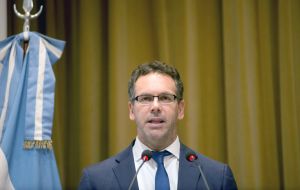MercoPress. South Atlantic News Agency
Argentine Central Bank will produce more Pesos: higher inflation is expected
 The danger is that this seasonal increase in the monetary base ends up putting more pressure on the exchange rate at the end of the year.
The danger is that this seasonal increase in the monetary base ends up putting more pressure on the exchange rate at the end of the year.  At the end of August, the chief of BCRA, Guido Sandleris, had acknowledged that the monetary goal negotiated with the International Monetary Fund (IMF) would not be met and yesterday the planned expan
At the end of August, the chief of BCRA, Guido Sandleris, had acknowledged that the monetary goal negotiated with the International Monetary Fund (IMF) would not be met and yesterday the planned expan According to estimates among analysts, the Argentine Peso's production will be around $ 300,000 million for the remainder of the year, estimating inflation for 2020 even higher than this year. 80% of that issuance corresponds to the last month of the year, breaking the objective that the Central Bank of Argentina (BCRA) of “zero-emission” had set and jeopardized the exchange control as it works since August.
In September and October, a 2.5% increase in the monetary base was announced, although it will be much smaller than what will be increased in December. In that last month, there is a great jump every year in the number of Pesos in circulation since both individuals and companies demand more money.
The danger is that this seasonal increase in the monetary base ends up putting more pressure on the exchange rate at the end of the year.
The great uncertainty related to the coming monetary expansion is to what extent it will cause more pressure on the exchange rate. Everything will depend, in short, on the demand for money registered. If there are too many Pesos circulating that the public or companies do not want, the consequence is that they will be used to buy dollars. At the end of August, the chief of BCRA, Guido Sandleris, had acknowledged that the monetary goal negotiated with the International Monetary Fund (IMF) would not be met and yesterday the planned expansion for the base in these two months was announced.
For their part, the FMI stated the new measures. ”The BCRA announced new monetary goals today (Wednesday). We hope that meetings with the Argentine authorities in the coming weeks will be an opportunity for dialogue. The IMF staff remains committed to Argentina and continues to work with the authorities to address the difficult situation facing Argentina ”.
To avoid that the currency undergoes a sharp jump towards the end of 2019, it is possible that the government that assumes in a few months will be forced to tighten even more the current exchange controls, which until now were much stronger for companies than for the public (which has a high purchase limit of $ 10,000 per month).
Last year the jump was 6% only in December and the decision not to absorb it subsequently caused a sharp jump in both inflation and the exchange rate in March.
The different measures announced since PASO will have a strong fiscal impact, estimated at around $ 100,000 million but could be even greater. It is not known exactly, however, because it was never made explicit by the Government.
The use of the famous “social clause” that was foreseen in the agreement with the Fund already advanced that the red of the primary accounts (before the payment of interest) would be located near 0.5% of the GDP, but now it will end up being a lot higher. Without financing in the markets, the only option is to cover the pothole with the Pesos’ issuance.
According to Infobae, the chief economist of Economy and Regions, Diego Giacomini, estimated that “the financial needs until the end of the year amount to around USD 10,000 million. Of that amount, half are Pesos, so we have a very significant danger of rising inflation. If there are no substantive reforms by the future government, it is very likely that inflation in 2020 will be even higher than this year.”
On October 27, the Argentines will decide who will assume the presidency, although the protectionist and Kircherist Alberto Fernández, along with his vice president, former President Cristina Fernández, is the favorite since his symbolic triumph in the August primary elections.




Top Comments
Disclaimer & comment rulesCommenting for this story is now closed.
If you have a Facebook account, become a fan and comment on our Facebook Page!